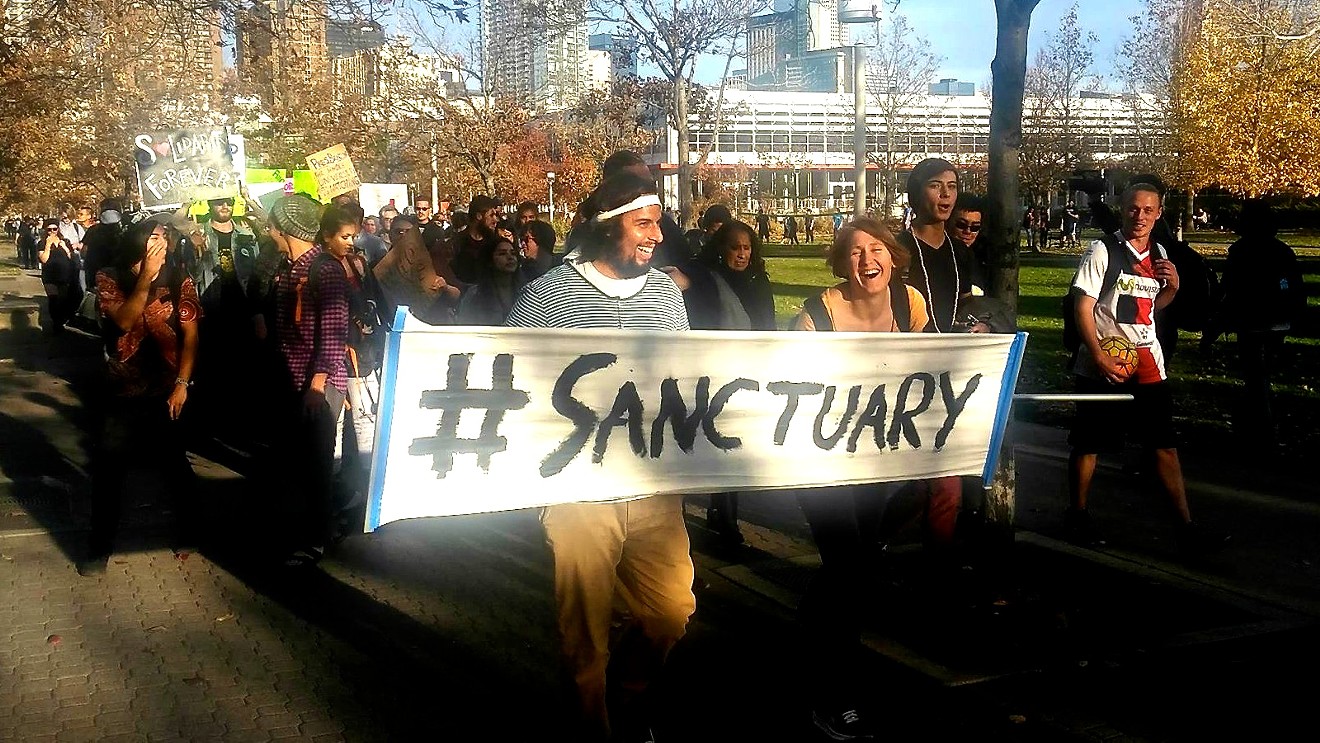But one of Colorado’s most prominent immigration law firms, the Meyer Law Office, doesn’t believe either measure goes far enough.
According to the firm’s firebrand founder, who represents prominent clients like Jeanette Vizguerra and was the subject of the April 10 Westword cover story “IRE and ICE,” neither proposal specifically addresses ICE officers arresting individuals at probation offices, which is how, Meyer claims, “ICE is fixing the game.”

Hans Meyer and other immigration-rights advocates want Denver to adopt sanctuary-city policies.
Jake Holschuh
“That’s a pretty disgusting thing to hear about," says Meyer. “Because this is after courts and the prosecutor and the victim and the defendant agree that a person — usually a first-time offender of a low-level crime — deserves probation and are not a danger to the community. But then you have employees with the city who’re helping those on probation get through that process — getting a second chance and rehabilitating — also actively working with ICE to facilitate their deportation."
In April, the Meyer Law Firm was one of the principal proponents behind a proposed sanctuary city policy that was unveiled at a packed community meeting in Lincoln Park.

A full room at the Denver Inner City Parish on April 27 when immigrant-rights advocates introduced their sanctuary-city proposal.
Chris Walker
The proposal from April, the city council’s proposed ordinance, and the Mayor’s executive order are similar in that they codify not honoring ICE detainer requests: when local jails hold onto specific inmates past their release dates so that ICE has more time to review them.
But the three proposals take different turns after that, especially when it comes to city employees being able to communicate with ICE. While Meyer and other immigrant rights advocates were not able to convince council members Robin Kniech or Paul Lopez to go quite as far they wanted (the council members purposely avoided the word “sanctuary,” for example), the proposed ordinance does restrict city employees from voluntarily sharing information with the feds (unless presented with a warrant), which includes giving ICE the jail release dates of inmates who are undocumented. The probation department is not mentioned, but it could potentially fall under that umbrella of non-communication.
When the mayor released his draft executive order to the Denver Post last Tuesday, August 1, Meyer says that he was broadsided. (Councilman Lopez has also said he didn’t know about the executive order until a day before it was announced.)
“It’s a little unclear when the mayor’s office came up with this idea of an executive order," Meyer says. “It’s a slap in the face to have the mayor’s office go behind our backs and try to defeat the [city council] legislation that addresses more substantive problems — like notification about jail releases.”
The Mayor's office sent this statement to Westword:
We continue to stand with Denver’s immigrant and refugee communities and are committed to protecting them and their contributions to the vitality of our city from the Trump administration’s chaotic immigration policies.
This is why the city has reformed its sentencing laws, created Plea by Mail, provided safe harbor for immigrant and refugee victims and joined litigation challenging the White House’s immigration policies.
The Hancock Administration is proposing an Executive Order that focuses on the respect, trust and collaboration between community members and city officials that is critical to keeping Denver’s immigrant and refugee communities safe and thriving. This proposal is in draft form and will continue to incorporate input moving forward.
A spokeswoman for Lopez and Kniech sent us this statement:
“We recently learned from the Mayor’s office that they are considering issuing an Executive Order to codify many of the practices the City already does regarding public safety. We do not believe that their draft accurately does that or that it goes far enough to ensure greater safety for our Denver residents. The draft has not had the benefit of community input like our ordinance has. We look forward to continuing discussions with the Mayor and the community to help ensure folks feel comfortable enough to testify in court and call the police in an emergency without the fear of the city reporting them to ICE.”
Frustrated and feeling that neither proposal goes far enough, Meyer hopes that city officials, especially in the mayor’s office, will collaborate more with experts and advocates in the immigrant community before drafting policies.
“It’s been hard to find a true and progressive voice on this who’s in elected office in the City of Denver," he says. “We’ve seen the mayor’s office, and to a lesser extent Denver City Council, want the accolades of protecting immigrant communities without doing any of the actual work."
Because of an editing error, the story incorrectly stated Mayor Hancock's response to comment for this piece. Westword regrets the error.














